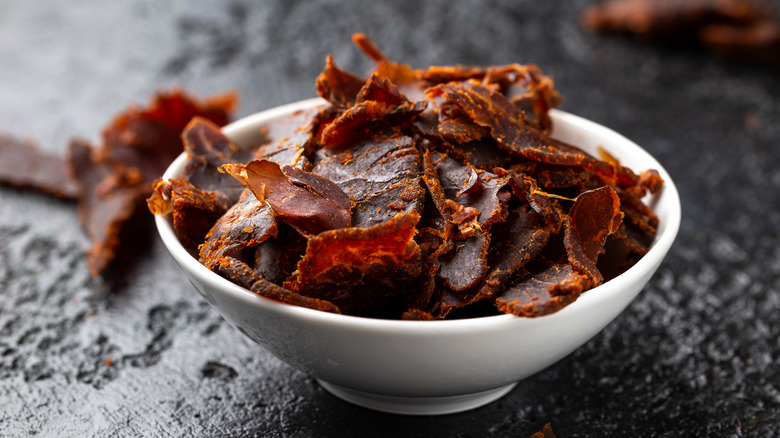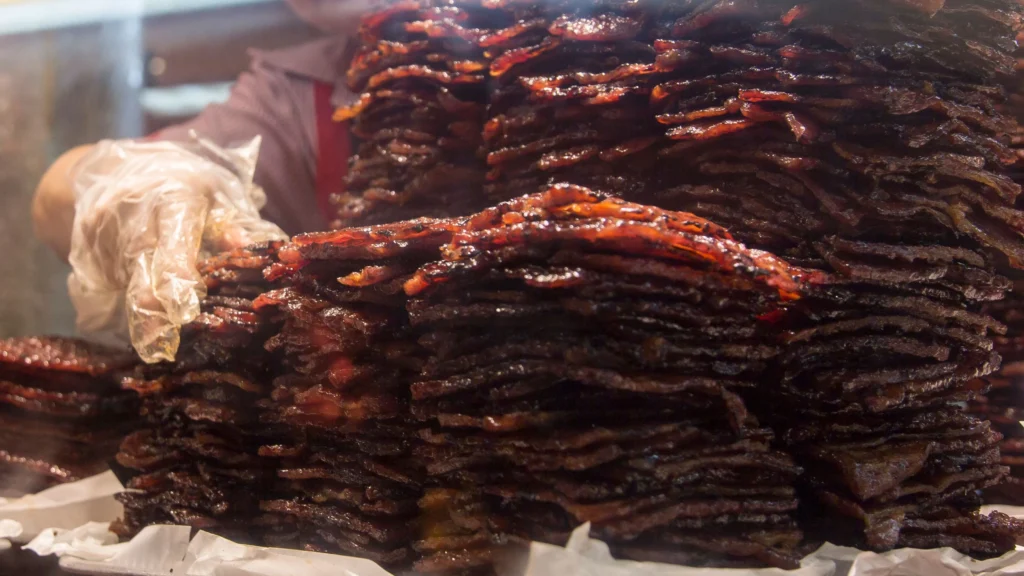What It Means for Consumers—and Safer Plant-Based Snack Alternatives
Introduction: A Wake-Up Call for Conscious Eating
In a startling announcement, over 15,000 pounds of beef jerky have been recalled across the United States due to serious food safety concerns. While beef jerky is a common snack found in gas stations, supermarkets, and convenience stores, this recall raises urgent questions not only about food safety, but also about the broader risks associated with processed meat products.
If you’re a vegetarian or simply health-conscious, this event might reaffirm your decision to choose plant-based snacks over animal-based ones. In this article, we’ll break down the reason behind the recall, explore the potential health risks, and introduce safe, delicious vegetarian snack alternatives you can feel confident eating.
Why the Recall Happened: The Facts

According to the U.S. Department of Agriculture’s Food Safety and Inspection Service (FSIS), a Texas-based meat producer has issued a voluntary recall of 15,165 pounds of ready-to-eat beef jerky products. The reason? The products were found to be produced without federal inspection, a direct violation of USDA regulations.
Key Details:
- Recall Date: July 2025
- Product Type: Ready-to-eat beef jerky
- Problem: Lack of federal inspection prior to sale
- Status: Distributed nationwide via online retailers and physical stores
- Risk Level: Classified as a Class I recall, meaning there is a high risk of health hazard if consumed
These jerky products bypassed standard safety checks designed to detect bacterial contamination, improper handling, or packaging issues, putting consumers at potential risk for illnesses such as salmonella, E. coli, and listeria.
What’s the Risk?

The lack of inspection means that these products could contain harmful bacteria, especially if they were processed or stored improperly. Since beef jerky is a dried meat product, any contamination during the drying or seasoning process can easily go unnoticed until it becomes a health issue.
Potential health issues include:
- Food poisoning symptoms like nausea, vomiting, abdominal cramps, and diarrhea
- Severe complications for individuals with weakened immune systems, children, and the elderly
- Listeriosis, which can cause miscarriage in pregnant women
- Long-term issues from infections like E. coli O157:H7, including kidney failure
How to Know if You Bought Affected Products

FSIS has urged consumers to check packaging carefully. Recalled jerky products are often sold under generic or small brand labels and may not be obvious.
Check for:
- Missing or unclear USDA inspection marks
- Vacuum-sealed jerky with no batch number or “best by” date
- Products purchased from non-certified vendors or questionable websites
If you’re unsure whether the jerky you purchased is safe, it’s best to discard the product immediately or return it to the store for a refund. Do not consume it, even if it smells or looks normal.
Bigger Picture: The Hidden Dangers of Processed Meats

This recall is not an isolated case. In recent years, processed meats—including hot dogs, sausages, and jerky—have been linked to several health and safety controversies.
According to the World Health Organization (WHO):
“Processed meats are classified as Group 1 carcinogens, meaning there is sufficient evidence they cause cancer in humans.”
Regular consumption of processed meat has been linked to:
- Colorectal cancer
- Heart disease
- Type 2 diabetes
- Increased inflammation and oxidative stress
For people following a vegetarian or plant-based lifestyle, avoiding these risks is already part of their health-conscious decision-making. But for others, this may be a powerful reason to rethink snacking habits.
Safer Alternatives: 100% Vegetarian Snack Swaps

If you’re ditching jerky or just looking for healthier, plant-based alternatives, you’re in luck. Today’s food market offers nutrient-rich vegetarian snacks that are equally satisfying—without the health risks.
1. Mushroom Jerky
Made from shiitake or portobello mushrooms, these snacks are meaty in texture, rich in umami, and packed with B vitamins and antioxidants. They’re typically marinated in soy, garlic, and maple, then slow-dried for a chewy finish.
2. Dehydrated Veggie Chips
From kale to beets, air-dried vegetable chips offer crunch and flavor without excess oil or preservatives. Look for options with minimal ingredients and baked or dehydrated instead of fried.
3. Roasted Chickpeas
Seasoned and roasted until crispy, these little bites are a protein and fiber powerhouse. You’ll find flavors like sea salt, sriracha, or garlic herb, perfect for curbing hunger between meals.
4. Spicy Trail Mix
Mix your own using nuts, seeds, and dried fruit, adding spices like cayenne or paprika for heat. It’s portable, customizable, and provides healthy fats and energy.
5. Seaweed Snacks
Light, crispy, and slightly salty, seaweed sheets are a low-calorie snack full of iodine, magnesium, and antioxidants. Great for on-the-go snacking.
6. Tofu Jerky
A rising star in the plant-based world, tofu jerky mimics traditional jerky in texture and taste—but is entirely plant-based. Often marinated in soy, ginger, and garlic, it’s protein-rich and cholesterol-free.
Family-Friendly, Kid-Safe Options
One benefit of plant-based snacks is they’re generally safer for children. Unlike meat jerky—which can be tough to chew and pose contamination risks—plant-based options are:
- Easier to digest
- Less processed
- Free from preservatives like nitrates and MSG
Great picks for kids include:
- Apple slices with peanut butter
- Mini veggie wraps
- Homemade energy balls with oats and dates
Food Safety Tips for All Shoppers
Whether you’re buying plant-based or conventional snacks, food safety should always come first. Here’s how to protect yourself and your family:
1. Read Labels Carefully
Look for products with clear expiration dates, batch numbers, and inspection or certification marks.
2. Buy From Reputable Brands
Stick to companies that are transparent about sourcing and manufacturing.
3. Store Properly
Even dried snacks like jerky or trail mix need cool, dry conditions. Opened packages should be resealed and consumed within a few days.
4. When in Doubt, Throw It Out
If a snack smells off, feels slimy, or tastes unusual—don’t risk it.
Why More People Are Switching to Plant-Based Snacks
Health scares like this beef jerky recall are leading many consumers to explore plant-based lifestyles. But it’s not just about avoiding risk—it’s about gaining health.
Benefits of Plant-Based Snacking:
- Lower cholesterol
- Higher fiber intake
- Less exposure to foodborne pathogens
- Reduced environmental impact
- Often lower in sodium and saturated fat
It’s a simple yet powerful switch that aligns with long-term wellness goals.
Conclusion: Rethink What’s in Your Pantry
This nationwide recall of over 15,000 pounds of beef jerky is more than a safety alert—it’s a teachable moment. It highlights the vulnerabilities in our food system and the importance of making informed, mindful choices.
Whether you’re vegetarian, flexitarian, or simply curious about healthier snacks, now is the time to explore safer, plant-based options. They’re delicious, sustainable, and most importantly—free from the risks tied to contaminated meat products.





